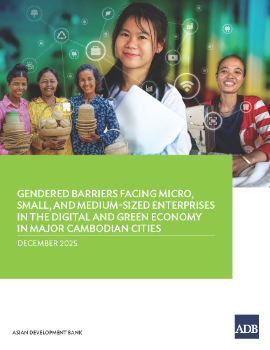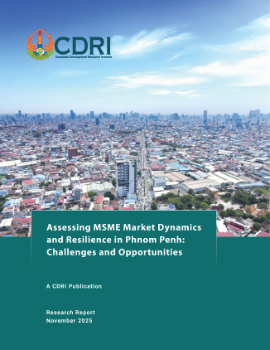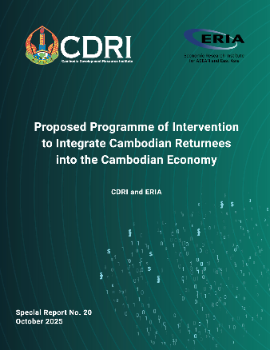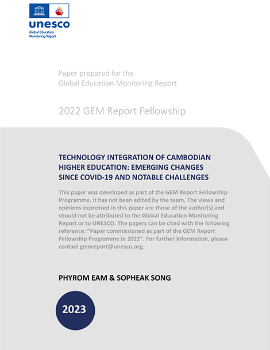
Gendered Barriers Facing Micro, Small, and Medium-Sized Enterprises in the Digital and Green Economy in Major Cambodian Cities
Drawing on extensive data and stakeholder insights, it reveals how unequal access to knowledge, finance, and networks can hold back enterprises owned by women. The report sets out targeted policy recommendations for inclusive economic development where women entrepreneurs are empowered to lead in the digital and green economy.For the full report, p...

Assessing MSME Market Dynamics and Resilience in Phnom Penh: Challenges and Opportunities
This report examines the market dynamics and resilience of micro, small, and medium enterprises (MSMEs) in Khan Meanchey, Phnom Penh, based on data from 14,820 establishments. MSMEs are deeply embedded in the urban economy, with nearly every household engaged in business activity. Despite a strong post-pandemic recovery in 2023, early signs of...

Proposed Programme of Intervention to Integrate Cambodian Returnees into the Cambodian Economy
In response to the mass return of over 910,000 Cambodian migrant workers from Thailand in 2025, this report by CDRI and ERIA outlines a comprehensive intervention programme to address the resulting economic and social challenges. The programme proposes short-term measures such as emergency cash transfers, debt relief, public works employment, and s...

Effectiveness of the Life Skills for Equality Project (LSEP)
The Life Skills for Equality Project (LSEP), a gender-transformative program1 implemented by Room to Read (RtR) -Cambodia, has demonstrated promising results in equipping boys with essential life skills and promoting gender equality. This research study examined LSEP's effectiveness in fostering boys’ education engagement, promoting gender...

Information Needs Assessment for Persons with Disabilities in Cambodia
Background:Closely echoing the Convention on the Rights of Persons with Disabilities (CRPD), the 2030 Agenda for Sustainable Development and its 17 Goals call upon State Parties to ensure the full and equal participation of persons with disabilities in all spheres of society, including access to information. As part of its mandates, UNESCO contribu...

Supply of and Demand for Accessible and Affordable Childcare Services in Cambodia
Cambodia’s economy has been growing rapidly over the past two decades, owing in part to women’s participation in the labor market. Female labor force participation is relatively high (74 percent) as compared to the regional average (59 percent); however, women are less likely than men to be in formal, better paid, and more secure forms of...

Empowering Women for Climate Resilience in Cambodia
Cambodia has experienced significant economic growth and improved living standards over the last two decades, and gender equality has also improved, especially on outcomes such as girls and women’s human capital accumulation in education. However, the impacts of climate change could put the hard-earned economic development gains including those of...

LIBROS: Learning to Improve Book Resource Operational Systems in Cambodia-Technical Study Report
Children in low-and middle-income countries often struggle to master foundational academic skills, such as reading, despite years of schooling. Quality learning materials are essential to addressing this issue. In this Learning to Improve Books Resource Operational Systems (LIBROS) study, we explore ways to enhance the primary-level book supply cha...

Climate Change and Migration Patterns: Findings at the Commune Level in Rural Provinces of Cambodia
Migration forces rural people to find more and better jobs, which is key in generating incomes to sustain livelihoods and ensure food security in times of environmental change. In addition to agricultural production, climate change affects health, water, and energy resources and causes migration and conflict. The impacts of climate change on me...

Technology integration of Cambodian higher education: emerging changes since COVID-19 and notable challenges
The second decade of the 21st century marks the time the Royal Government of Cambodia (RGC) officially directs the nation’s public sector, economy, and society to accelerate technology adoption and digital transformation. This present study aims to observe developments of such direction in Cambodian higher education (HE) sub-sector before and in re...
